The journey of ICT Academy started in year 2009. Mr. Lakshmi Narayanan along with Government of India and Government of Tamil Nadu got together to visualize an organization which will be the center point for academia, industry and government. They decided that the organization should be non-profitable in nature, independent and it should be asociety, which cannot work for money. An organization working with important three pillars of the nation, without any commercial elements might sound pretty easy but it’s difficult when it’s into practices. I can proudly say that for the last 10 years we have been bracing the vision of our Chairman and will continue to do the same. From being a Tamil Nadu based organization we have spread our wings across the nation. Bengaluru was the first city to begin our operation out of Tamil Nadu and we were surprised to see tremendous amount of participation. Last year, we conducted Bridge conference at Bengaluru for the first time, and your participation in vast numbers has made us organize Bridge conference this year too.
POWER PANEL

Lakshmi Narayanan
Chairman, ICT Academy,
Emeritus Vice Chairman,
Cognizant Technology Solutions
ICT Academy is all about educating teachers who in turn educate the students. The primary purpose of ICT Academy is to make sure that students are equipped with necessary skills for the current industry trends and to enable self-learning among the students community. Technological industry invests heavily on R&D that demands constant learning. Therefore, the concept of self-learning will be important to augment these technological developments. While there have been a number of other organizations which trained students, we wanted to enable the teachers to learn latest technologies and that’s the pathway we choose when creating ICT Academy. The teachers were well educated and strong with the fundamentals but the connection with the industry was missing. Teachers should imbibe the self-learning culture among them to stay relevant. ICT Academy plays a major role in taking these kinds of conferences to the key places by partnering with colleges and nodal universities. The need to identifying Nodal University is to take the ToT model of training the students and faculties in tier II and tier III cities.
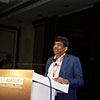
Dr Karisiddappa
Vice Chancellor,
Visvesvaraya Technological University
Today, technology is available everywhere and learning can happen anywhere, but there exists a lack of passion to learn. We need to create the passion among students to learn new concepts every day. Most of the faculty members still use traditional methods of delivering curriculum to the students. I recommend them to adapt to the modern teaching methods by blending their curriculum into the digital medium, which would create interest among students to learn.
I believe that a strong link between industry and academia will be a boon for the education sector. Teachers should get exposed to the industry through internships. Management of the Institutions should support teachers to spend at least 6 months in the industry by offering paid leave to them. Teachers should also learn cross domain skills, so that they can educate students on the same, which would open new avenues for students to explore. After all, it is the purpose of the teachers to kindle the interest of learning among the students.

S Thirulogachander
Global Head – IoT
Tata Consultancy Services
In Industry 4.0, every machines and devices stays connected, which leads to cyber physical security issues. We can understand that we are still in the evolution stage; it needs lot of developments to succeed the journey of Industry 4.0. The key drivers to build this ecosystem are the infinite database, because computing speed has increased, and data ranges have increased from 2KBPS to 1 GB. These are the parallel elements that evolve along with the industry and would trigger for a techno ready ecosystem. The three methodologies for this techno ready ecosystem are Connect, Collect and Capitalize. The other main developments in the working environment are automated production, predictive maintenance, connected machines, 3D Printing, Big Data, smart transport system and so on. Ultimately, the transformational skill requirements are the knowledge about ICT, ability to work with data, technical discipline and interpersonal skills.
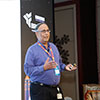
Dr Mouli Chandramouli
Architect,
Cisco Inc
Strengthening the research factor in the institutions is imperative to produce talents that suit the current industry demand. The gap between the industry and academia is still persistent in our country. Relationship between academia and Industries works only with expectations instead of implementation. Industry expects upskilled students but academia needs funding to upskill their faculties. From academic point of view, they need better job opportunities, funding or scholarship, reputed enhancement and equal partnership with the industry. Cisco has organized Center of Excellence, to deliver courses on IoT, and Network Security Practices. We have also enabled students enrollment for the Cisco Launch Pad, which aims to support startups on their entrepreneurial journey and help them scale to the next level by providing the critical resources they need.
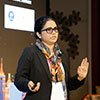
Anitha George
Group Head ERP Cloud,
Oracle India
Today, we have access to information across the world and what we can achieve with the Internet exponential. High speed internet connection is changing the world; buzzwords like sensors, 3D Printing, Robots, Cloud Computing and simulators etc., are digitally enabled with the help of Internet. Digitization is changing the way how companies perform. Hence, every organization must master the use and integration of new technologies like IoT, Big Data and Cloud. Companies are using the technologies of Industry 4.0 to increase the revenue, monitor the production, logistics, inventory and standardization. Digital innovation,digital supply chain, smart factory, modern shipping and logistics and connected digital servers are the way to transform manufacturing sector for the digital age. Oracle Academy aims to deliver advanced computing education globally to drive knowledge, skill development, innovation and diversity in the technology field. Skill is the key ingredient element to achieve.
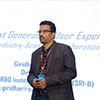
Giridhar Jakki
Head of Voice Intelligence Services
Samsung R&D
I recommend that industry and academia should collaborate to enable next generation user experience in the gadgets. Intelligent Assistants are fast emerging as the next breakthrough in User Interface. In 1980s we used PC, now it’s wireless app and by 2020 every Samsung product will be AI enabled creating entirely a new experience and value for the user. We are planning to use Bixby Vision, in which image search can be done through Machine Learning and Deep Learning mechanism. The machine will learn user behavior patterns through sensors and reciprocate the information that is relevant to the user. Collaborative innovation is the key to achieve new goals in technology industry. There is high demand for technology expertise. Jobs will be transformed into a skill based pay in which Data Science and Machine Learning becomes the determining technologies. Samsung India will be hiring 1000 Engineers for research in AI, Machine Learning and IoT. Therefore, updating students skills to the latest technology will create new scope and future.

Shraddhanjali Rao
Vice President - Human Resoruces
SAP India
Big Data, technology, socially connected world, demographics, complexity and rapidly shifting markets are the forces that are shaping the Industry 4.0. Big Data is changing the way we operate. From gathering data, it derives insights and predicts the future, which creates value for the end users. For example, retailers like Amazon and service companies like Uber have started using Big Data and AI to offer better solutions to its users. People hear that technology is going to take away the jobs but actually, it’s going to change the nature of the jobs completely. Technology evolves at rapid pace; we have to prepare the students for the futuristic jobs that we ourselves not clear about. Therefore the ideal solution will be, teaching the students on how to learn. While preparing the students for the future jobs, the focus should be 50% on enhancing the technological skills and 50% on honing the behavioural skills, as life skills are most important skills required to survive in an organization, which today’s youth lack. Similar to institutional environment, they expect immediate recognition and rewards for their work which is impractical in a work environment. Growth orientation, critical thinking, people management, cognitive flexibility, creativity and complex problem solving ability are the behavioural skills that are crucial for students. On the other hand, Artificial Intelligence, Robotics, Data Science, Cyber Security and Applied Machine Learning are the key domains to focus for the technical skill development in future.
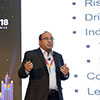
Dattaraj Rao
Principal Architect
GE Transportation
Internet is touching everyone’s life through platforms like Amazon, Uber, Netflix etc., which is evidentially the result of a big revolution happening in the industrial world. Machines have become a part of man’s life. From aircrafts to locomotives, people expect smarter machines with better sensors and connectivity. These machines generate huge amount of information, which need new technology to manipulate it as a meaningful data that would help to develop new ideas and products. AI and Big Data play a major role in fetching data that would augment Machine Learning and Deep Learning. We start this process with Products as Asset and then plan it at the process level and finally put it across the network level. For locomotives we need high definition camera, GoLANG Data aggregator platform and 8TG storage expansion. We wanted a common platform and so we created a Vision Development of Analysis model on cloud which has single platform from data acquisition to action, optimized storage and VI Catalog for deep and machine learning.
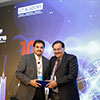
Chandrashekar Chenniappan
Senior Director HR
Virtusa
From an academic point of view, the journey of industrial revolution starts from 1.0 to 4.0. India was a core consumer in the industry period 1.0 and 2.0 but India became contributors in the industry 3.0 and 4.0. The Five major building blocks of industry 4.0 are Advanced Analysis & Big Data, IoT & Services, Robotics & Automation, AI and Process Digitization. As an advantage, by 2020 India is expected to corner 20% of global IoT market, by 2025 India is expected to corner 32% of global Big Data market. These data points show the volume of opportunities lying in front of us. We have to channelize our efforts and put our focus on right things to build our future generation. Repeated and monotonous jobs will be automated which will in turn bring impact in Indian job sectors. We have to develop a flexible and open mind to learn new things for new future. We need to teach youth to focus on qualitative skills in their area and move forward without compromising fundamentals and foundation. Creating awareness, willingness to change, study to learn, and culture of innovation are the key aspects required to move forward in Industrial Revolution 4.0.

Divyanshu Verma
Senior Manager
Intel Corporation
Industry 4.0 is a name given to the current trend of automation and data exchange in manufacturing technologies. Cognitive Computing is one of the key technologies of Industry 4.0. The goal of Cognitive Computing is to simulate human thought processes in a computerized model. Using self-learning algorithms that use data mining, pattern recognition and natural language processing, so that computers can mimic the way the human brain works.
Academia should teach the technologies of industry 4.0 to the students to stay relevant and updated. It’s no more machine learning instead its human learning about the machine. It’s the era of Deep Learning, where a machine can learn anything within few hours by comparing the data for years and replicate the outcome with the best results which humans take years to achieve. Machines are becoming creative. So, humans should learn the machines bette

Vinod Nair
Director - HR Business Partner
Huawei Technologies India
I would like to elaborate on the 4 phases of learning (Learning 4.0) in evolution of human history. During the first phase (Learning 1.0), the knowledge passed down from the generation to generation through the forefathers. The second phase of learning (Learning 2.0) is the beginning of institutional learning and in the last century, the learning happened through standardized education board which is the third phase of learning (Learning 3.0). Currently, we are in the fourth phase of learning (Learning 4.0), the era of self-learning. Udacity is the online education platform that offers Massive Open Online Courses (MOOCs). Udacity’s first course on Introduction to Artificial Intelligence attracted more than 1.6 lakh students from over 190 countries. Students have access to many resources; they don’t need a teacher. Teacher’s job is not to teach something new anymore. Instead, they need to teach the students how to use these platforms effectively. 85% of jobs that will exist in 2030 haven’t been invented yet. The top skill for future readiness is solving complex problems, critical thinking, creativity, emotional intelligence, negotiation and cognitive flexibility. Change is happening rapidly and we have the responsibility to tune into the changing needs, changing aspirations and change in learning.